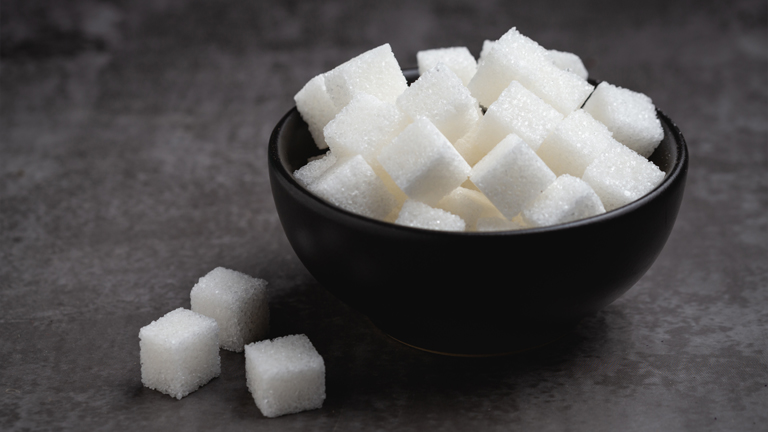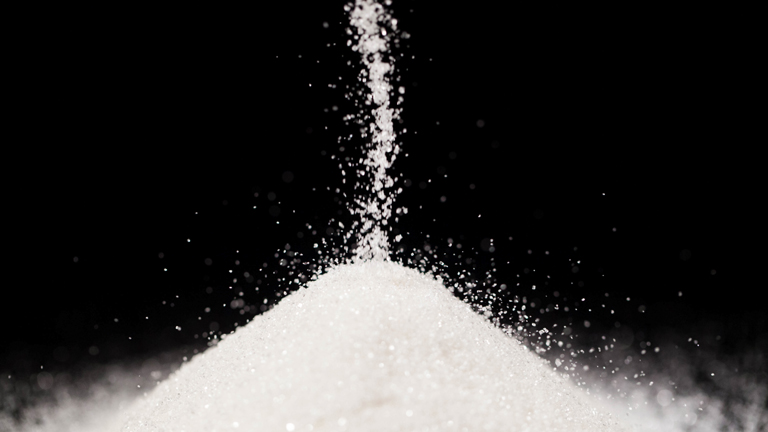Refined sugar is everywhere—hidden in processed foods, beverages, and even seemingly “healthy” snacks. While it makes food taste delicious, excessive consumption leads to serious health risks, including obesity, diabetes, and heart disease. In this comprehensive guide, we’ll explore the dangers of refined sugar, its impact on your body, hidden sources in everyday foods, and healthier alternatives to satisfy your sweet tooth.
Must Check : Type 2 Diabetes
What Is Refined Sugar? (Definition + Basics)
Refined sugar, also known as processed sugar or white sugar, is derived from sugarcane or sugar beets. During refining, natural molasses, vitamins, and minerals are stripped away, leaving behind pure sucrose.
Types of Refined Sugar:
- Granulated Sugar (Common table sugar)
- High-Fructose Corn Syrup (HFCS) (Used in sodas & processed foods)
- Powdered Sugar (Finely ground sucrose)
- Brown Sugar (White sugar + molasses)
Unlike natural sugars found in fruits (fructose) and dairy (lactose), refined sugar lacks nutritional value and causes rapid blood sugar spikes.
How Refined Sugar Affects Your Health (Primary Risks)
Excessive sugar intake is linked to numerous health problems:
1. Weight Gain & Obesity
- Sugar is high in empty calories, promoting fat storage.
- Fructose in sugar increases hunger hormones (ghrelin) and reduces satiety (leptin).
2. Blood Sugar Spikes & Insulin Resistance
- Refined sugar causes rapid glucose surges, leading to energy crashes.
- Over time, this can result in insulin resistance, a precursor to type 2 diabetes.
3. Increased Risk of Heart Disease
- Studies show high sugar intake raises triglycerides and LDL (“bad”) cholesterol.
- Excess sugar contributes to inflammation and arterial damage.
4. Tooth Decay & Poor Oral Health
- Sugar feeds harmful bacteria in the mouth, leading to cavities and gum disease.
5. Accelerated Aging & Skin Damage
- Sugar promotes glycation, a process that damages collagen, leading to wrinkles.
The Link Between Sugar and Chronic Diseases (Diabetes, Heart Disease, etc.)
Diabetes
- Frequent sugar consumption overloads the pancreas, impairing insulin production.
- Research confirms that sugary drinks increase type 2 diabetes risk by 26%.
Heart Disease
- A study in JAMA Internal Medicine found that people consuming 17-21% of calories from sugar had a 38% higher risk of heart disease.
Fatty Liver Disease
- Excess fructose is metabolized in the liver, leading to non-alcoholic fatty liver disease (NAFLD).
Cancer Risk
- High sugar diets may fuel cancer cell growth due to increased insulin and inflammation.
Hidden Sources of Refined Sugar in Your Diet (Unexpected Foods)
Many “healthy” foods contain hidden sugars. Always check labels for:
- Breakfast cereals (even “whole grain” options)
- Yogurt (flavored varieties often have added sugar)
- Salad dressings & ketchup
- Granola & protein bars
- Bread & pasta sauces
- Sports drinks & flavored waters
Watch for these sugar aliases:
- Sucrose, dextrose, maltose, agave nectar, cane juice, fruit concentrate.
Sugar Addiction: Why It’s So Hard to Quit (Neurological Effects)
Sugar triggers dopamine release, similar to addictive substances.
Why You Crave Sugar:
- Brain Reward System: Sugar activates pleasure centers, leading to cravings.
- Withdrawal Symptoms: Fatigue, headaches, and irritability when cutting sugar.
- Habitual Consumption: Regular intake rewires brain chemistry, making quitting difficult.
Tip: Gradually reduce sugar to minimize withdrawal effects.
Healthy Alternatives to Refined Sugar (Stevia, Honey, Monk Fruit, etc.)
Swap refined sugar with natural, low-glycemic sweeteners:
| Sweetener | Benefits | Best Uses |
| Stevia | Zero calories, no blood sugar spike | Tea, coffee, baking |
| Raw Honey | Antioxidants, antimicrobial properties | Smoothies, dressings |
| Monk Fruit | 300x sweeter than sugar, zero carbs | Desserts, beverages |
| Coconut Sugar | Low glycemic index, contains minerals | Baking, oatmeal |
| Dates | Fiber-rich, natural sweetness | Energy balls, shakes |
How to Reduce Sugar Cravings Naturally (Diet & Lifestyle Tips)
1. Eat More Protein & Fiber
- Keeps you full and stabilizes blood sugar.
2. Stay Hydrated
- Sometimes thirst is mistaken for sugar cravings.
3. Get Enough Sleep
- Poor sleep increases ghrelin (hunger hormone).
4. Manage Stress
- Cortisol triggers sugar cravings—try meditation or exercise.
5. Use Spices Like Cinnamon
- Naturally sweetens food and helps regulate blood sugar.
The Science Behind Sugar and Inflammation (Gut Health & Immunity)
- Sugar feeds harmful gut bacteria, leading to dysbiosis.
- Chronic inflammation from sugar is linked to autoimmune diseases.
- High sugar intake weakens immune response, making infections more likely.
Sugar Detox: A Step-by-Step Guide (Actionable Plan)
Week_1 (Refined Sugar):
- Cut sugary drinks (soda, juice).
- Replace desserts with fruit.
Week_2 (Refined Sugar):
- Avoid processed snacks.
- Read labels for hidden sugars.
Week_3 (Refined Sugar):
- Cook meals at home to control ingredients.
- Try sugar-free recipes.
Week_4 (Refined Sugar):
- Notice improved energy, clearer skin, and fewer cravings.
Myths About Refined Sugar Debunked (Common Misconceptions)
- “Natural sugars are just as bad.”
Truth: Fruits contain fiber, slowing sugar absorption. - “Sugar-free products are healthy.”
Truth: Artificial sweeteners may disrupt metabolism. - “You need sugar for energy.”
Truth: Whole foods provide steady energy without crashes.
Conclusion
Refined sugar is a major contributor to modern health crises. By understanding its risks, identifying hidden sources, and switching to healthier alternatives, you can protect your long-term health. Start small, stay consistent, and enjoy the benefits of a low-sugar lifestyle!
Ready to cut sugar? Try a 7-day sugar detox and feel the difference!


